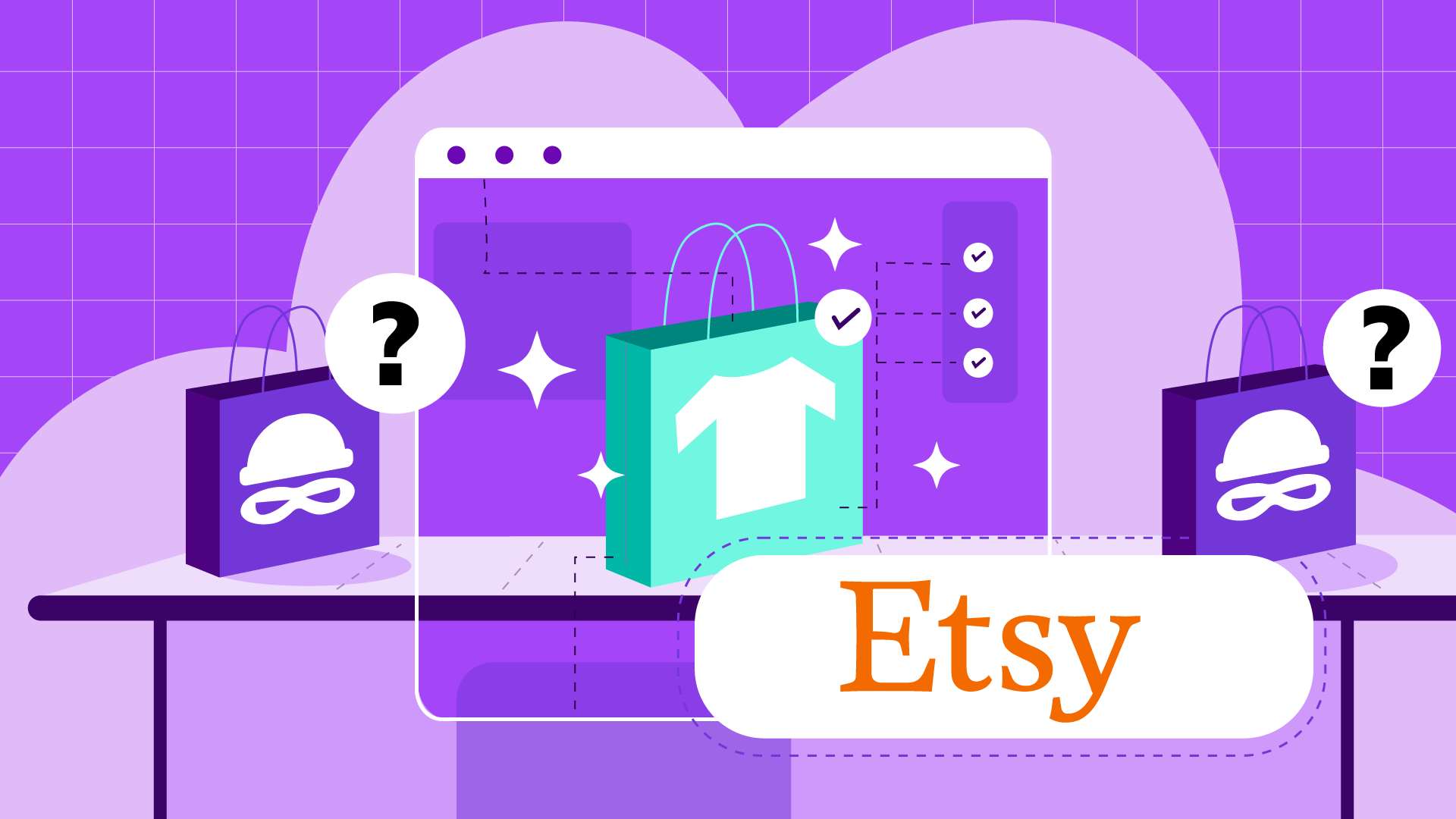Etsy has long been a go-to marketplace for sellers looking to showcase their unique, handmade, and vintage items. Known for its vibrant community and niche appeal, Etsy provides a global marketplace that can bring your products to an international audience.
However, Etsy is not without its challenges—high fees, stiff competition, and the ever-changing algorithm can make it difficult for some sellers to thrive. Fortunately, there are several alternatives to Etsy that UK sellers can explore to expand their reach and boost sales.
🔑 Key Takeaways:
Folksy:
- Great for targeting local buyers with lower fees
- Smaller audience and less traffic than Etsy
Not On The High Street:
- Ideal for premium, curated items with strong marketing support
- High fees and a selective application process
eBay:
- Access to a massive audience and diverse product categories
- High competition and pressure to lower prices
Depop:
- Popular with younger shoppers and offers social media integration
- Limited to niche markets like fashion and accessories
Amazon Handmade:
- Global reach and high trust level
- Substantial fees and strict guidelines to follow
With Vendoo, you can manage multiple marketplaces with just a few clicks, making it easier than ever to diversify your selling strategy.
💡 Tip: In this article, we will compare and contrast selling fees for various Etsy Alternatives, so here is a reminder of the Etsy UK fee structure:
Etsy seller fees in the UK include several components. Collectively, a rough estimate is 12% of the sale price.
- Listing fee: £0.15 per item
- Transaction fee: 6.5% transaction fee on the total sale price, including shipping.
- Payment processing fee: 4% plus £0.20 per transaction
For example, if you sell jeans for €10:
The transaction fee would be €0.65.
The payment processing fee would be €0.40, plus £0.20. Converting the €10 sale to GBP (assuming an exchange rate of 1 EUR = 0.85 GBP), the sale amount would be £8.50.
Therefore, your total fees would be £0.15 (listing fee) + £0.55 (transaction fee) + £0.54 (payment processing fee), totalling £1.24.
Thus, from a €10 sale, you would net approximately £7.26 after Etsy fees.
1. Folksy
Founded in 2008, Folksy is a UK-specific marketplace designed for artisans and crafters. It reports a supportive community of local sellers and buyers, making it an ideal platform for those looking to connect with a domestic audience. Folksy focuses on handmade items, craft supplies, and vintage pieces, providing a niche market similar to Etsy but with a distinctly British flavour.
Folksy does not report the number of active users on the marketplace, but did share that it received 210k website visitors in the 2023 holiday season.
Folksy is a baby Etsy with a fraction of the audience but also a fraction of the fees.
Folksy: An Etsy Alternative
Let’s explore the pros and cons of selling on Folksy in comparison to selling on Etsy.
Folksy Pros:
- UK-Based: Unlike Etsy, Folksy is a UK-specific marketplace, which can help you target local buyers more effectively.
- Low Fees: Folksy charges a lower commission fee compared to Etsy, making it a more affordable option for sellers.
- Supportive Community: Folksy boasts a tight-knit, supportive community of UK artisans and crafters.
Folksy vs. Etsy Seller Fees
Folksy charges a listing fee of £0.15 per item, a 6% commission fee, and a 2% + £0.20 payment processing fee. In comparison, Etsy charges a £0.16 listing fee, a 6.5% transaction fee, and a 4% + £0.20 payment processing fee.
For a £10 item with £2.50 postage, Folksy’s total fees are approximately £0.92, whereas Etsy’s total fees are about £1.31.The lower fees making it more cost-effective for sellers compared to Etsy’s fees, and don’t forget about Etsy’s additional advertising and subscription fees.
💡 Tip: For more information about fees, review the Folksy fee structure.
Folksy Cons:
-
Smaller Audience: Being UK-specific, Folksy has a smaller user base than Etsy, potentially limiting your reach.
-
Less Traffic: Folksy doesn’t receive as much traffic as Etsy, which might impact visibility and sales.
-
Less Tools: Folksy does not offer the robust tools and features that you will find on Etsy.
Simplify your reselling journey today. List, manage, and grow - all in one place! Try Vendoo!
2. Not On The High Street
Launched in 2006, Not On The High Street (NOTHS) is a UK-based marketplace renowned for its curated selection of high-quality, unique items. It attracts a targeted audience seeking distinctive, handmade products.
NOTHS does not report the number of active users on the marketplace, but web analysis reports confirm that it receives 30 million annual visits.
The marketplace is selective about its sellers, ensuring that only the best make it through the application process, which helps maintain its high standards.
Not On The High Street: An Etsy Alternative
Let’s explore the pros and cons of selling on NOTHS in comparison to selling on Etsy.
Let’s explore the pros and cons of selling on NOTHS in comparison to selling on Etsy.
Not On The High Street is like a fancier luxury version of Etsy. Luxury does, however, come with higher seller fees.
Not On The High Street Pros:
- Curated Marketplace: Not On The High Street is known for its curated selection of high-quality, unique items, which can enhance your brand's reputation.
- Targeted Audience: The platform's audience is specifically looking for unique, handmade items, similar to Etsy's demographic.
- Strong Marketing Support: The site provides robust marketing support, including features in email newsletters and social media.
- Exclusivity while this might be a con as well, exclusivity is often appealing to both sellers and buyers, giving them pride in using the marketplace.
Not On The High Street Cons:
- High Fees: The commission fees are higher than those on Etsy, which might cut into your profits.
- Stringent Application Process: Getting approved to sell on Not On The High Street can be challenging, as they maintain a selective onboarding process.
Not On High Street vs. Etsy Seller Fees
Not On The High Street has much higher selling fees than Etsy.
NOTHS charges a one-time joining fee of £199+VAT and a 25%+VAT commission on all sales.
Etsy, on the other hand, charges a £0.16 listing fee, a 6.5% transaction fee, and a 4% + £0.20 payment processing fee.
For a £10 item with £2.50 postage, NOTHS's total fees amount to approximately £3.25, while Etsy’s total fees are about £1.31. This is nearly triple the selling fees.
💡 Tip: For more information about fees, review the NOTHS fee structure.
3. eBay
eBay is the largest and most lucrative global peer-to-peer marketplace. Founded in 1995, eBay is one of the world's largest online marketplaces, with a massive global audience. Sellers can list a wide variety of items, from handmade goods to electronics and fashion. eBay’s flexibility in selling options, including auctions and fixed-price listings, makes it a versatile platform for many types of products.
eBay: An Etsy Alternative for Sellers
Let’s explore the pros and cons of selling on eBay vs. Etsy in the UK.
eBay Pros:
- Massive Audience: eBay’s vast user base can offer you access to a much larger audience than Etsy.
- Diverse Product Categories: eBay allows you to sell a wide range of items, not just handmade or vintage goods.
- Flexible Selling Options: You can choose between auction-style listings or fixed-price listings, providing flexibility in how you sell your items.
Did you know that eBay has no selling fees for private clothing sellers in the UK?
eBay Cons:
- Lower Prices: The expectation of bargains on eBay can sometimes force sellers to price their items lower than on Etsy.
- Higher Competition: The sheer volume of sellers on eBay means higher competition, which can make it harder to stand out.
You might also be interested in the article How to Make More Sales on eBay!
eBay vs. Etsy Seller Fees in the UK
eBay selling fees are slightly higher than Etsy’s, although eBay has no selling fees for clothing for private sellers.
eBay charges a final value fee of 12.8% + £0.30 per order for most categories, a 0.35% regulatory operating fee, and insertion fees that may apply based on listing volume.
Etsy charges a £0.16 listing fee, a 6.5% transaction fee, and a 4% + £0.20 payment processing fee.
For a £10 item with £2.50 postage, eBay’s total fees are approximately £1.85, while Etsy’s total fees are about £1.31.
However, if the item was jeans or clothing, note that eBay does not have fees for clothing from private sellers!
💡 Tip: For more information about fees, review the eBay Seller Centre.
4. Depop
Let’s explore the pros and cons of selling on Depop vs. Etsy in the UK.
Depop: An Etsy Alternative for Sellers
Depop, founded in 2011, is a marketplace that combines social media and e-commerce, particularly popular among younger, fashion-forward shoppers. 90% of Depop shoppers are under the age of 26, so the marketplace is primarily Gen Z.
Depop is known primarily for fashion and accessories but offers a large range of selling categories. The app’s interface encourages a community feel, similar to social networks.
💡 Did You Know: Etsy owns Depop! Etsy acquired Depop in 2021.
Depop Pros:
- Young, Trendy Audience: Depop is particularly popular among younger shoppers, which can be beneficial if your products appeal to this demographic. This might also be a con depending on your inventory.
- Social Media Integration: Depop’s layout and functionality are similar to social media platforms, making it easy to promote your items and engage with buyers.
Did you know that Depop has no commission fees for clothing sales in the UK? Start selling with Vendoo!
Depop Cons:
- Niche Market: Depop primarily focuses on fashion and accessories, which may not suit all Etsy sellers. However, vintage fashion is a top seller which is one of Etsy’s primary categories.
- Transaction Fees: Depop's fees can add up, especially with payment processing costs.
You might also be interested in the article Is Vinted or Depop Better? A Vinted vs. Depop Review.
Depop vs. Etsy Seller Fees in the UK
eBay selling fees are slightly higher than Etsy’s, although eBay has no selling fees for clothing for private sellers.
Depop charges a 10% selling fee on the total sale price and a 2.9% + £0.30 payment processing fee. Etsy charges a £0.16 listing fee, a 6.5% transaction fee, and a 4% + £0.20 payment processing fee.
For a £10 item with £2.50 postage, Depop's total fees are approximately £1.80, while Etsy’s total fees are about £1.31.
However, if the item was jeans or clothing, note that eBay does not have fees for clothing from private sellers!
💡 Tip: For more information about fees, review the Depop Blog.
5. Amazon Handmade
Handmade at Amazon: An Etsy Alternative
Amazon handmade is for all things handmade, but with the giant Amazon audience. Launched in 2015, Amazon Handmade is Amazon’s answer to Etsy, providing a global platform for artisans to sell their handmade goods. Sellers benefit from Amazon's extensive customer base and the trust associated with the Amazon brand. It offers a wide reach and streamlined purchasing process, ideal for expanding your market.
Amazon Handmade Pros:
-
Global Reach: Amazon Handmade offers access to Amazon’s extensive global customer base, which can significantly boost your sales potential.
-
Trusted Platform: Being part of Amazon, this marketplace benefits from high levels of trust and a streamlined purchasing process.
-
Ease of Use: Many shoppers already use Amazon and have saved checkout information and delivery preferences
Amazon Handmade Cons:
-
High Fees: The Amazon audience comes with a price tag. Amazon Handmade charges substantial fees, which can be a barrier for smaller sellers.
-
Strict Guidelines: The platform has strict guidelines and requirements that sellers must adhere to, which can be challenging to navigate.
Amazon vs. Etsy Selling Fees in the UK
Amazon Handmade charges a 12.24% referral fee on each sale, with no listing or monthly subscription fees, as the £25/month Professional selling plan fee is waived for Handmade sellers.
In comparison, Etsy charges a £0.16 listing fee, a 6.5% transaction fee, and a 4% + £0.20 payment processing fee.
For a £10 non-clothing item with £2.50 postage, Amazon Handmade’s total fees are approximately £1.53, while Etsy’s total fees are about £1.31.
💡 Tip: For more information about fees, review the Amazon Handmade page.
The Many Places to Sell Handmade and Vintage Items Online
Exploring alternatives to Etsy can open new doors for sellers looking to expand their reach and diversify their sales channels. Platforms like Folksy, Not On The High Street, eBay, Depop, and Amazon Handmade each offer unique advantages and come with their own set of challenges.
By leveraging Vendoo, you can easily cross-list your products on multiple marketplaces, ensuring you get the most out of each platform with minimal effort.
Diversifying your selling strategy not only helps mitigate risk but also maximises your potential for growth in the dynamic world of e-commerce.
List to Etsy and other marketplaces in seconds! Get started with Vendoo today!






